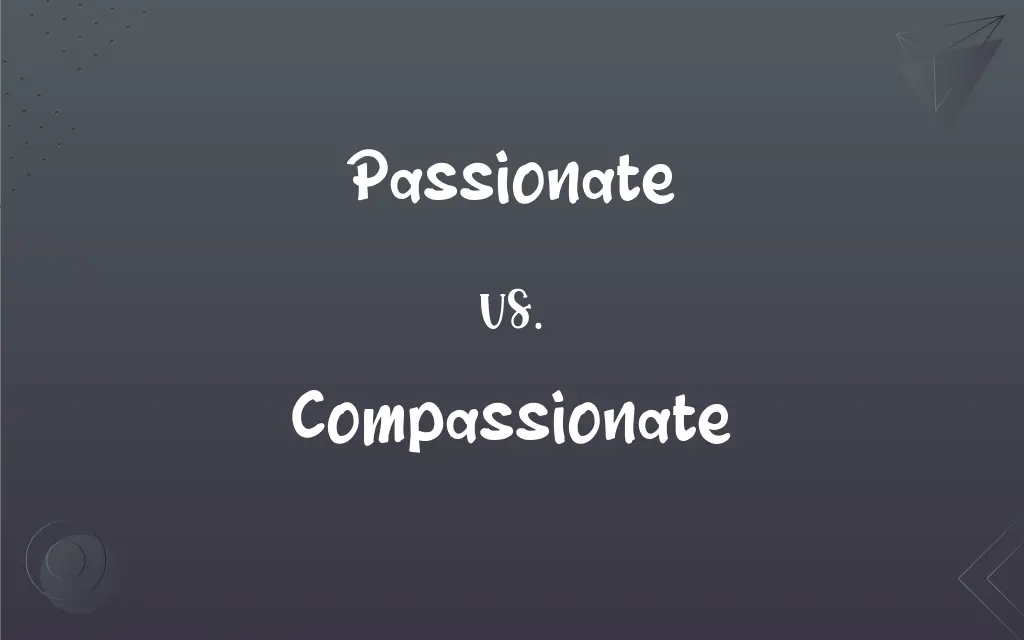Passionate vs. Compassionate: What's the Difference?
Edited by Harlon Moss || By Janet White || Published on December 1, 2023
Passionate is having intense emotions or enthusiasm towards something, while compassionate means showing empathy and concern for others.

Key Differences
Passionate individuals exhibit a strong emotional attachment or intense enthusiasm towards an interest, activity, or belief. Compassionate individuals, however, display empathy, understanding, and concern towards the suffering or hardships of others.
Being passionate is about having a deep sense of engagement and zeal for something, be it a hobby, a cause, or a job. In contrast, being compassionate involves a sense of emotional connection to others, particularly in their times of need or distress.
A passionate person is often driven by their emotions, which fuels their dedication and fervor in their pursuits. On the other hand, a compassionate person is more focused on their sensitivity and responsiveness to the emotions and well-being of others.
The term passionate often describes an intense internal feeling that propels an individual to action. Compassionate, however, describes an outward expression of sympathy and a desire to help alleviate others' suffering.
Passionate people are often admired for their strong convictions and energetic commitment, while compassionate people are valued for their kindness, understanding, and selfless concern for the welfare of others.
ADVERTISEMENT
Comparison Chart
Focus
Internal interests and enthusiasms
Others' feelings and suffering
Nature
Emotional intensity and zeal
Empathy and sympathy
Outcome
Drives personal or collective action
Promotes caring and supportive behavior
Involvement
Often self-centered
Inherently other-centered
Common Associations
Zeal, fervor, dedication
Kindness, empathy, helpfulness
ADVERTISEMENT
Passionate and Compassionate Definitions
Passionate
Having or showing strong emotions and enthusiasm.
She was passionate about environmental conservation.
Compassionate
Feeling or showing empathy towards others' suffering.
He showed compassionate care for the sick.
Passionate
Demonstrating a high level of interest or devotion.
He is passionate about classical music.
Compassionate
Exhibiting a desire to help those in distress.
Their compassionate response to the crisis was commendable.
Passionate
Characterized by intense feelings or strong beliefs.
His passionate speech about justice inspired many.
Compassionate
Being aware of and sympathetic to others' feelings.
She was compassionate towards her friend's struggles.
Passionate
Exhibiting a strong inclination or enthusiasm toward an activity.
She was passionate about her career in art.
Compassionate
Showing sympathy and concern for others.
Her compassionate nature made her a beloved teacher.
Passionate
Expressing strong emotions or convictions.
Their passionate debate was engaging and thought-provoking.
Compassionate
Kind and considerate, especially towards people in difficulty.
The compassionate nurse comforted the patient.
Passionate
Capable of, having, or dominated by powerful emotions
A family of passionate personalities.
Compassionate
Feeling or showing compassion; sympathetic.
Passionate
Wrathful by temperament; choleric.
Compassionate
Granted to an individual because of an emergency or other unusual circumstances
Compassionate military leave.
FAQs
Does being compassionate mean sacrificing oneself?
Compassion involves caring for others, but it doesn't necessarily require self-sacrifice.
Is passion always positive?
While often positive, passion can sometimes lead to negative outcomes if not balanced.
Can compassion be learned?
Yes, compassion can be cultivated through empathy and understanding others' experiences.
Can a lack of passion be compensated with skill?
Skill is important, but passion often provides the motivation and drive for ongoing improvement.
Is compassion always related to sadness or suffering?
Compassion often responds to suffering, but it can also relate to general care and kindness.
Does compassion require action?
Compassion often leads to supportive actions, but it can also be expressed through understanding and empathy.
Is being passionate necessary for success?
Passion can be a driving force for success, but it's not the only factor.
Do compassionate people always work in caring professions?
While many do, compassion is a quality that can be expressed in any profession.
Is passion a prerequisite for creativity?
Passion can fuel creativity, but creativity can also arise from curiosity, skill, and other factors.
Is compassion a natural trait or learned behavior?
Compassion can be a natural trait, but it can also be nurtured and developed over time.
Can someone be both passionate and compassionate?
Yes, an individual can exhibit both qualities in different aspects of their life.
Is being passionate about a hobby as valuable as a career?
Yes, passion in hobbies is valuable and contributes to overall happiness and fulfillment.
Does being passionate guarantee expertise?
While passion drives learning and improvement, expertise also requires practice and experience.
Can passion be harmful?
Uncontrolled or misdirected passion can be harmful, especially if it disregards others' wellbeing.
Can someone be compassionate towards themselves?
Yes, self-compassion is an important aspect of overall compassion.
Are compassionate actions always big gestures?
No, compassionate actions can be small, everyday acts of kindness and understanding.
Can compassion fatigue occur?
Yes, individuals in caring roles can experience compassion fatigue from overextending themselves emotionally.
Can passion change over time?
Yes, passions can evolve and change as individuals grow and have new experiences.
Can passion and compassion coexist in a profession?
Absolutely, many professions benefit from a combination of passion for the work and compassion for others involved.
Can passion be quiet or subdued?
Yes, passion doesn't always manifest as outwardly intense; it can be quietly powerful.
About Author
Written by
Janet WhiteJanet White has been an esteemed writer and blogger for Difference Wiki. Holding a Master's degree in Science and Medical Journalism from the prestigious Boston University, she has consistently demonstrated her expertise and passion for her field. When she's not immersed in her work, Janet relishes her time exercising, delving into a good book, and cherishing moments with friends and family.
Edited by
Harlon MossHarlon is a seasoned quality moderator and accomplished content writer for Difference Wiki. An alumnus of the prestigious University of California, he earned his degree in Computer Science. Leveraging his academic background, Harlon brings a meticulous and informed perspective to his work, ensuring content accuracy and excellence.






































































